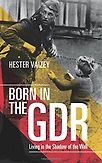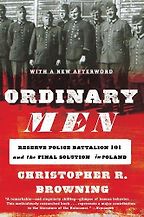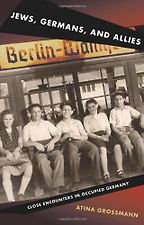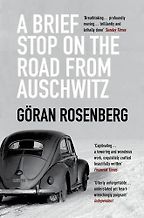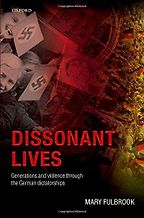Looking at your book choices and having read your own book about East Germany, I’m struck by how traumatic modern German history has been. I guess it makes me all the more impressed by the kind of country that Germany is now.
I’ve always loved history for its stories about people—and there are some pretty amazing stories about Germans in the 20th century. So much has happened to Germany. It’s such a dramatic 20th century: defeat in two world wars, two different types of dictatorship, a wall and then a wall falling, and now an East German chancellor and a Germany that is the strongest economic power in Europe. Modern Germany has a pretty amazing story.
Germany is an economic powerhouse but also, compared to Britain’s attitude to refugees, it also feels, to many, like a moral beacon right now. Is that your sense too?
Angela Merkel has received a lot of stick for the stance she’s taken domestically within Germany, but she made that her stance and she has stuck with it. It seems to me that she’s really someone who really stands by her convictions—a real leader in a world where some leaders say what they want to get supporters on side, or even blow with the wind.
“My list is very Jewish-Holocaust heavy, but I wasn’t trying to be representative. These are books that have stayed with me”
It might also have something to do with Germany’s history at the end of the World War II, when Germany’s borders were redrawn. Lots of Germans who were living in what was called the Sudetenland were on the move and had to make that long trek to Germany—with lots of them dying of starvation and cold en route. So they do have a history—the Germans have felt first-hand the impact of being refugees. That may also be part of the story.
Your own book, Born in the GDR, is a collection of stories about East Germans, many of whom feel they’ve been dismissed—that everything they believed in has been superseded by West Germany. How does Angela Merkel fit into that narrative?
She doesn’t fit into it at all. She’s a complete anomaly. Most of the people that I interviewed commented on that fact. The people I spoke to were coming of age when the wall fell. Their East German parents didn’t really know how to help them get on in the new Germany. They didn’t really know how anything worked in the West German system. They felt at a massive disadvantage. They didn’t have the network or Daddy’s friends who could set them up with a cushy job. They felt that even now the media—like Der Spiegel—is dominated by western perspectives and western journalists. Some were chippy about it, maybe, but, having talked to them, they have good reason for such feelings.
In the light of that, they expressed great surprise that Angela Merkel got into that position. She’s an exception to the rule, I would say.
Let’s look at some of the books you’ve chosen, starting with Christopher Browning’s Ordinary Men (1992). Poland’s Jews were basically wiped out in the space of eleven months and one question is how the Nazis were able to find the manpower to do that. Browning homes in on these ordinary men—not soldiers, but middle-aged, family men from Hamburg—who did these horrible things. It opens with them shooting Jewish women, children, and the elderly in a village. That’s about as far as I got.
It’s horrendously difficult reading because it takes you through the psychological transformation from ordinary, middle-aged men into killing machines, almost. I remember, when I studied history at university, that it was one of the books—out of all the hundreds of thousands of history books out there—that really stayed with me. It was so vividly written.
We know a lot about the Holocaust and how it happened but less about what the killers themselves felt about what they were doing. And understandably it has been quite a taboo topic. In the book, there are descriptions of these men shooting people at close quarters. They end up with brains and blood on their faces. 20% of their battalion drop out because they found it too distressing, but 80% percent carry on.
Browning talks about how they drank a lot of alcohol to keep going. There’s some comfort to be had in knowing that this behaviour didn’t come naturally in some way. Alcohol was a crutch that they needed to get through.
It’s one of those things we wonder about the Nazis and the Holocaust—are these people other from us or are they just humans too? And Christopher Browning gives them a very human face.
I had a student who was quite disengaged and wasn’t sure whether he’d made the right choice studying history. He did an essay on the Holocaust and he read this book. It was a defining moment. He wrote me a letter, at the end of his degree, to say thank you. He cited this book as the reason that he carried on doing history.
Is it so compelling because, as you’re reading it, you’re wondering what you yourself would have done if you had been one of those men?
I think that’s a question that runs through all the projects that I’ve done—what would you have done in the situation? If you grew up in Nazi Germany, what would you have done? Obviously, the state had set up a system that made it very hard to resist. There were great costs to doing so. They tried to make people feel powerless to resist. The way Browning brings that to life and breaks it down to the nitty gritty of day-to-day life is both vivid and moving.
What did enable the Nazis to turn ordinary men into killing machines? Is there one takeaway from the book?
I’m not sure there’s just one, that would be a bit simple. But he shows just how much Nazi propaganda was effective in dehumanising Jews. When Germans talked about a Jewish neighbour, or the doctor, or someone that they knew, they talked about Jews in normal, friendly terms. But then there was “the Jew”—this theoretical monster that was an enemy of the German people, who was going to be responsible for the destruction of Germany if they didn’t get there first.
That was very effective and it was media-controlled. You can see how subtly the state managed to drip feed anti-Semitism in a dehumanising fashion. That was the real point, when you follow these average middle-aged men and their descent.
The next book on your list is a bit more overtly academic in approach, although it’s also about individual narratives. This is Atina Grossmann’s Jews, Germans, and Allies: Close Encounters in Occupied Germany (2007). This is set just after the fall of Berlin in 1945.
It’s also a hugely emotive book. At the end of the World War II, over a quarter of a million Jewish survivors find themselves in Germany—the territory of their perpetrators. Jews are living cheek by jowl, in a place where a few days, weeks, months previously, their relatives and, probably, in many cases, their whole family have been destroyed. How do you get your head around that?
The book is about how that plays out in reality and the interactions between Germans and Jews. Also, how Germans and Jews competed with each other for benefits and favours—and a sense of victimhood—in their interactions with the Allies. On the one hand, the Jews had six million dead. On the other, the Germans had been defeated in war. With the redrawing of the borders, they had all these refugees, people who had been living in the Sudetenland making their way back to the new German soil in difficult circumstances. Thousands of women had been raped, particularly by Russian but also by other Allied soldiers. They had suffered in the bombings. They had suffered in many ways. So the Germans also felt a sense of victimhood.
“At the end of the war, Jews get more ration allocations than ordinary Germans”
I was most struck, reading this book, by her description of how there was a real boost in the birth-rate amongst Jewish women at the end of World War II. It was an act of defiance against Nazi genocide. Women were flaunting their bumps and pushing their prams. Jewish life would continue, despite all the efforts of the Germans to wipe them out.
Grossman also describes how, in a sense, the shoe is on the other foot. At the end of the war, Jews get more ration allocations than ordinary Germans. She describes an encounter where a Jewish person is at the opera and spots an SS kapo who is then arrested. He has been walking free and had not had to face the consequences of what he had done during the war until then.
It’s a situation that was obviously very challenging. The social history of that period, at the end of World War II is absolutely fascinating. You tend to think of history as having discrete dates—a beginning and end—but this book shows just how messy and untidy the whole thing is, and how the consequences of war linger on.
At the beginning of the book, there’s a quote from a woman living in Berlin: “Big reports about the death camp in Auschwitz. Even if only a small part is true—and I fear it’s all true—then the rage of the entire world against the Nazis is understandable. Poor Germany.”
There are plenty of other books about Germany’s sense of victimhood at the end of the war. They’re wrapped up in their deprivation as a result of the bombing, the continued rationing, and the fact their men are still away. Some stayed in prisoner of war camps, in Russian internment, for 11 years at the end of the war. As ordinary citizens, we might sympathise with their feelings of victimhood. But how do you square that with the fact that they have also been complicit, if only in passivity, with the Nazi reign of power?
Just in terms of the historiography, the first serious books about the Holocaust emerge in the 1960s. Was there a lack of investigation of the period in the direct aftermath of the war?
Essentially, in the 1960s, you had these Europe-wide and American student movements. There was the trial of Eichmann in Jerusalem and there had been some trials in Frankfurt. Young people who had grown up with their parents’ silence about these issues were suddenly watching Eichmann’s televised trial and thinking, ‘Hang on, what did my parents do?’ And some uncomfortable questions were raised that led to some serious generational conflict. It was the start of the realisation of how much had been shoved under the carpet.
Now we’re on to book number three, which is A Brief Stop on the Road from Auschwitz (2012) by Goran Rosenberg.
My list is very Jewish-Holocaust heavy, but I wasn’t trying to be representative. These are books that have stayed with me. I reviewed this book for the Times Higher Education Supplement. It left me in tears. It’s not strictly German history, in the sense that it’s about a Polish Jewish couple who survive Auschwitz and then, at the end of the war, relocate to Sweden. But it’s very relevant because they are victims of the Nazi persecution and it’s indicative of how so many Jewish refugees had to reinvent themselves at the end of the war, and the challenge of living with the shadow of the Holocaust.
Goran Rosenberg is the son of this couple. He talks about how his youth is overshadowed by the Holocaust. His parents are desperate to blend into Sweden society. They give him a Swedish name. At the same time though, they talk to him in their mother tongue—which he pretends he doesn’t hear because he doesn’t like the fact this makes him different from the other children at school.
“His father was not deemed damaged enough by his experience at Auschwitz”
His father takes a job in a truck factory. He isn’t welcome at all—the Swedes don’t really want the refugees there. This poor man, as one of the survivors of the Holocaust, has this huge pressure to make the most of his life—he’s a lucky one who has survived—while all the time facing these road blocks trying to make the most of their new life.
For his father, the breaking point is in 1952. The West German government says that there will be compensation to victims of the Holocaust—and his father makes a claim as part of the process. The doctor who he sees is duty-bound to try and minimize the number of compensation claims. So, his father is not deemed damaged enough by his experience at Auschwitz. This was the straw that broke the camel’s back and the poor man has a breakdown and ultimately commits suicide.
These are all pretty miserable stories, really, but absolutely fascinating in terms of the long-term consequences of the Nazi persecution. They humanise the experience very effectively.
When I started the book, I saw that his wife survived, he survived, they have children. It seemed like there was going to be a happy ending, and then you realise that there can’t be. It’s beautifully written, isn’t it, in a novelistic way?
Yes, that’s a theme in the books that I’ve chosen. It’s extremely accessible and readable so that you almost don’t know that you’re reading non-fiction.
The book is about Goran trying to understand his father in a way that he didn’t at the time.
It’s something that his parents never talked about. People who have been through such horrendous experiences often don’t talk about it with their nearest and dearest. His father died and then, years later, he’s trying to piece together his parents’ life in Poland before the war. What happened when they were taken into slave labour?
He knows part of the story from when he was growing up. He has letters and correspondence and all sorts that he’s consulting to piece together the jigsaw of this life that has not been talked about.
Let’s go on to the fourth book on your list, which is Mary Fulbrook’s Dissonant Lives (2011).
Mary Fulbrook is one of the most eminent scholars of German history. She’s a bit of a heroine of mine. This book is a more general sweep of 20th century Germany. It gives you a sense of what it would have been like to have lived through fascism and then communism—and then the end of communism.
Both regimes required conformity to their system. They had very different values and huge penalties for stepping out of line. East Germans of a certain age had to navigate and tell stories about themselves and their actions, in the different systems, that presented them in the best light—wherever they happened to be.
“Men and women make history but not in circumstances of their own choosing”
Men and women make history but not in circumstances of their own choosing. If you were living under fascism, in the 1000-year Reich that Hitler was planning, you wouldn’t have known, at the time, that it was going to end. So you made your decisions. There were career Nazis—if you’ve got a family and want to put food on the table and provide, then maybe you do join the party. I’m not making excuses, but if that’s the way the wind’s blowing then you might make that decision.
Then, twelve to fifteen years later, how do you spin your Nazi career decision? It’s amazing to chart how people commute and tell their slippery tales and present themselves. Germany had this tumultuous 20th century and this is the ultimate challenge.
Five Books interviews are expensive to produce. If you're enjoying this interview, please support us by donating a small amount.
A postmodernist talks about how individuals are shaped by the society they live in, which is undoubtedly true. At the same time, you see people, who remain individuals, faced with moral choices. And they make decisions. They retain—historians are keen on the word—agency. They are individuals who are responsible for the choices they make.
How do they manage to frame a story in which they’re both good Nazis and good Communists?
With difficulty. Obviously, they tried to distance themselves from the Nazi regime pretty quickly in Spring 1945. At the end of the war, as the Russians are invading, the Nazi flags are burnt and all Nazi insignia are destroyed. It’s a story of reinvention. But it’s easier for some than for others.
Going back to Atina Grossmann’s book, you see, at the end of the war, that whereas before Jews had been persona non grata, suddenly Germans want to know a Jew who can say ‘he was a good German’ and give you the all clear. In the de-Nazification process, knowing a Jew and having a Jew who says that you’re alright is a valuable commodity.
“In the de-Nazification process, having a Jew who says that you’re alright is a valuable commodity”
Victor Klemperer—who wrote an enormous set of diaries about his persecution under the Nazis—talks about this in his writing about what it was like. He was an academic and was cut out by his colleagues and forced out. But, after the war, suddenly everyone wanted to know him again. I suppose that underlines the point Mary Fulbrook is trying to make.
Her book is also really interesting in terms of showing the importance of generation as an analytical tool. You think about gender, race, or class as things that we analyse, but she points out here how important age is in mobilising people—whether people were the right age or stage to receive the Nazi message or the communist message.
A lot of people who were very active in the Nazi regime were just too young to fight in World War I. They had this pent up sense of duty that they had not fulfilled—which they channelled into their Nazism.
Can you tell me about your final choice? It’s about East Germany’s secret police, the Stasi, and is called Stasiland (2002).
Stasiland is written by a journalist from Australia, Anna Funder, who moved over to Germany just after the wall fell. She placed an advert in the newspaper asking to speak to old Stasi officials.
Nearly one in seven people informed for the Stasi. There were 91,000 full-time employees, whereas the Gestapo had more like 7000. It was so pervasive. People love all the gory details of how the Stasi wired people’s houses, tapped their phones, collected smell samples from suspects in jars with the idea that sniffer dogs might be able to track their movements, all sorts of crazy spy equipment that feels so foreign to our world—although with Edward Snowden, perhaps not. She really brings all of that to life.
“Nearly one in seven people informed for the Stasi”
Her book is a collection of stories about people whose lives have been affected by the Stasi. She describes the whole process, from the correspondence she has with them and how she feels about what they’re saying.
For example, she agrees to meet a man under a clock and he’ll have a newspaper under his arm—this is pre-mobile phone. And she sits down opposite him, and she describes the whole thing—not just what he says about being a Stasi officer. It’s very lively and journalistic in its style. It really brings to life elements of life with the Stasi and made me particularly interested in life in East Germany. Her whole approach of interviewing and reporting on the experience of the interview as well as the content was the approach that I used in my own book.
I suppose, in my book, I was trying to report more of a range of experiences of life, the people who have more positive experiences too. But her book prompted me to delve into this area and I love her writing style.
And what is the explanation? Why were such a large percentage of people prepared to work for the Stasi or inform on others? Was it not that bad?
For some people, it gave them the chance of a promotion and they might get better rations. In the communist state, not everything was available all of the time. They might be able to go on holidays. And often, I think, the level of informing was not as formal as we might think. You might have a casual chat with someone on the street and they might be pumping you for information without you fully realising that that was what they were doing.
“A lot of people I spoke to didn’t realise how pervasive the Stasi was”
I think sometimes people informed because they thought that by giving some information, but not the worst information, they might be protecting someone—a loved one. And maybe some people were strongly convinced by the importance of adhering to the rule of the state. These are the curtain twitchers, the people who wanted to uphold the law.
But I think the numbers are slightly misleading. It isn’t that each one in seven were rabid communists who were fully committed to the cause.
Did you get the sense from talking to people that they thought the Stasi was really bad?
It depends. The whole point of my book is that your experience hugely depended on your background and your attitude to the government. Mario—the subject of chapter five of the book—was imprisoned by the Stasi. He was a homosexual and had tried to escape East Germany, which was a crime. That was the reason for his incarceration.
He felt the force of the state very strongly in prison, spending three months in solitary confinement and with regular interrogations.
“There’s this idea that information is power—and so they just hoarded the stuff”
But I would say a lot of people I spoke to didn’t realise how pervasive the Stasi was. They didn’t have any direct interactions with it, and so they were surprised, after the wall fell, to discover just how much information the Stasi had gathered. They gathered more paper files in forty years than had been gathered in Germany from the Middle Ages until the end of World War II. They gathered information on what brand of toothpaste you bought, what time you collected your children from school, whether you ate your main meal in the evening rather than in the middle of the day and if you were a deviant. All this kind of stuff.
So when you were hauled into interrogation, someone could say ‘Well we know you buy xxx toothpaste.’ And then you’d go, ‘oh no! They know everything already. There’s no point withholding!’ There’s this idea that information is power—and so they just hoarded the stuff.
Coming from the West, it’s easy not to think about what German unification meant for the East. In your book, you’ve got a quote from one East German diarist: “A country is erased just like that. Struck-out, finished, over, full stop.” Everything you grew up believing in suddenly vanishes overnight—or is deemed inferior. What that must be like to go through is just incredible really.
I think precisely that. From a western perspective, you might think, ‘Oh great. Why would you not think it was all rosy to have freedom of travel, freedom of speech, freedom to vote as you choose in elections?’ And it’s not like anyone I spoke to actually wanted to go back to the old system.
But the point that always sticks with me is this woman who said, ‘I always wished to travel to foreign parts but I always wanted to be able to come home.’ And I guess, as East Germany was absorbed into West Germany, home became increasingly unfamiliar. As East Germans, they didn’t know how to pronounce items on the McDonald’s menu or how to work a coin-operated trolley at the supermarket. They knew that their clothes looked different and that their whole behaviour was just not quite right. Some East Germans tried to buy cars with western number plates and to change the way that they dressed. But after 40 years, their whole outlook and mentality had been shaped by the communist system. Even if they hadn’t been particularly ardent in their support of it, their whole world has been shaped and moulded by it. It was not possible to just shrug it off overnight.
Another point you make in the book is that 98% of women were employed in East Germany. As an economic system, communism doesn’t work as well as capitalism—but there were some good things about it. For a lot of the East German interviewees in your book, important things were lost—like social cohesion and working towards a common goal. There’s a sense the baby was thrown out with the bathwater.
There might be something that could be learned from those systems. As you say, not all of it works but there were some good things that could have been considered in the blending of the two countries. That was certainly the view of a lot of East Germans who I interviewed.
That 98% figure for women: on the face of it you might say, ‘Brilliant female employment high!’ But women persisted, even after 40 years, in preferring to have male bosses, and they were still in lower-paid, lower-status jobs. Who was doing the housework at home? Well, that was the women as well. You can say it wasn’t really emancipation, because they weren’t choosing it.
But the people that I talked to had, for most part, grown up with their mothers working while they went to free state kindergarten, and the expectation that they too would be working mothers. They then found, in the western system, that childcare was expensive and women weren’t so readily accepted into the workforce. So they hit a roadblock there. Many found that it wasn’t financially possible or viable to work in the west.
It’s not straightforward what emancipation is. On the one hand, it was enforced in East Germany, but, on the other hand, it did affect women’s attitudes to work.
Interview by Sophie Roell, Editor
May 25, 2017. Updated: May 16, 2024
Five Books aims to keep its book recommendations and interviews up to date. If you are the interviewee and would like to update your choice of books (or even just what you say about them) please email us at [email protected]

